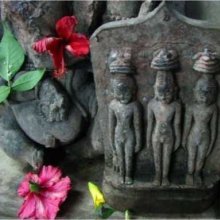Baneshvara, Bāṇeśvara, Bana-ishvara: 5 definitions
Introduction:
Baneshvara means something in Hinduism, Sanskrit. If you want to know the exact meaning, history, etymology or English translation of this term then check out the descriptions on this page. Add your comment or reference to a book if you want to contribute to this summary article.
The Sanskrit term Bāṇeśvara can be transliterated into English as Banesvara or Baneshvara, using the IAST transliteration scheme (?).
Images (photo gallery)
In Hinduism
Shaivism (Shaiva philosophy)
Source: Wisdom Library: ŚaivismBāṇeśvara (बाणेश्वर) is the name of a Liṅga (symbolical manifestation of Śiva) that is associated with the Bāṇagaṅgā-tīrtha (a sacred bathing place). It represents the fifty-sixth of the sixty-four siddhaliṅgas mentioned in the Nepalese Tyasaphu (a folding book or leporello). At each of these spots Śiva is manifest as a Liṅga. Each of these liṅgas (e.g., Bāṇa-īśvara) has its own specific name, mantra, set of rituals and observances, auspicious time etc.
The auspiscious time for bathing near the Bāṇeśvara-liṅga at the Bāṇagaṅgā-tīrtha is mentioned as “caitra-śukla-caturdaśī” (latin: caitra-shukla-caturdashi). This basically represents the recommended day for bathing there (snānadina).

Shaiva (शैव, śaiva) or Shaivism (śaivism) represents a tradition of Hinduism worshiping Shiva as the supreme being. Closely related to Shaktism, Shaiva literature includes a range of scriptures, including Tantras, while the root of this tradition may be traced back to the ancient Vedas.
Languages of India and abroad
Sanskrit dictionary
Source: Cologne Digital Sanskrit Dictionaries: Aufrecht Catalogus Catalogorum1) Bāṇeśvara (बाणेश्वर) as mentioned in Aufrecht’s Catalogus Catalogorum:—son of Jaṭādhara, father of Nārāyaṇa (Prākṛtapāda, etc.). Oxf. 181^b.
2) Bāṇeśvara (बाणेश्वर):—father of Rāmakānta (Rāmalīlodaya). L. 302.
3) Bāṇeśvara (बाणेश्वर):—one of the authors of the Vivādārṇavasetu. Sūcīpattra. 34.
4) Bāṇeśvara (बाणेश्वर):—son of Rāmadeva, grandson of Viṣṇu, composed in 1744: Citracampū.
Source: Cologne Digital Sanskrit Dictionaries: Monier-Williams Sanskrit-English Dictionary1) Bāṇeśvara (बाणेश्वर):—[from bāṇa] m. Name of a Liṅga ([probably] = bāṇa-l), [Catalogue(s)]
2) [v.s. ...] Name of sub voce authors, [ib.]
[Sanskrit to German]
Sanskrit, also spelled संस्कृतम् (saṃskṛtam), is an ancient language of India commonly seen as the grandmother of the Indo-European language family (even English!). Closely allied with Prakrit and Pali, Sanskrit is more exhaustive in both grammar and terms and has the most extensive collection of literature in the world, greatly surpassing its sister-languages Greek and Latin.
See also (Relevant definitions)
Partial matches: Ishvara, Bana.
Full-text: Citracampu, Vivadarnavasetu, Ramalilodaya, Banagangatirtha, Ganaprakasha, Nandana mishra, Ramakanta, Jatadhara, Narayana vidyavinoda, Prakritavyakarana, Vidyavinoda, Trikanda, Namalinganushasana, Amarakosha.
Relevant text
Search found 4 books and stories containing Baneshvara, Bāṇeśvara, Bana-ishvara, Bāṇa-īśvara, Bana-isvara, Banesvara; (plurals include: Baneshvaras, Bāṇeśvaras, ishvaras, īśvaras, isvaras, Banesvaras). You can also click to the full overview containing English textual excerpts. Below are direct links for the most relevant articles:
Middle Chola Temples (by S. R. Balasubrahmanyam)
Temples in Belaturu < [Chapter IV - Temples of Rajendra I’s Time]
Jainism in Odisha (Orissa) (by Ashis Ranjan Sahoo)
Tritirthi image at Banesvara Temple, Balasore Town < [Chapter 3: Survey of Jaina Antiquities in Odisha]
Chaitanya Bhagavata (by Bhumipati Dāsa)
Verse 1.2.36-37 < [Chapter 2 - The Lord’s Appearance]
The Skanda Purana (by G. V. Tagare)
Chapter 53 - Śiva’s Attendants Go to Vārāṇasī < [Section 2 - Uttarārdha]
Chapter 69 - The Assembly of Sixty-eight Holy Spots < [Section 2 - Uttarārdha]
Chapter 33 - Description of Jñānavāpī < [Section 1 - Pūrvārdha]

